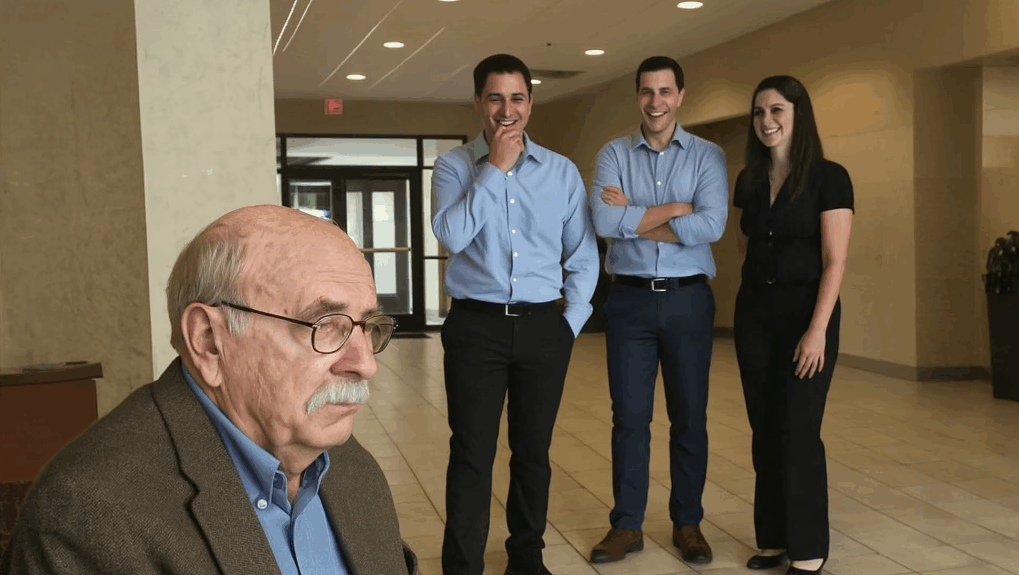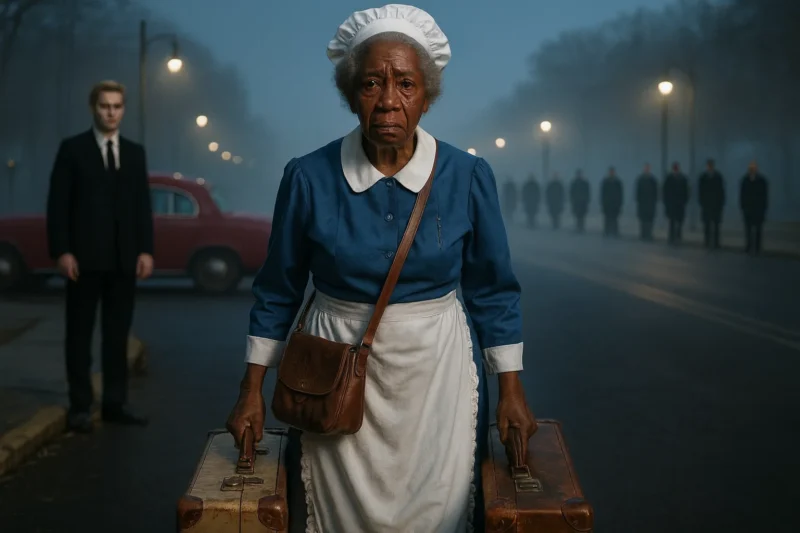He walked in, his coat a rumpled mess, his shoes worn thin. No identification. No assistant by his side. A man in his late seventies, clasping a folder and softly humming a tune by Sinatra.
“Excuse me, sir,” the receptionist said, her voice laced with apprehension. “This area is strictly for clients and employees.”
“Oh, I know,” he replied, a gentle smile gracing his lips. “I’m here for a scheduled meeting.”
A group of younger staff members strolled past, a collective snicker escaping them.
“Probably another confused elderly person,” one of them murmured.
“Perhaps he’s here to repair the coffee machine,” another quipped, a hint of amusement in their tone.
No one offered him a place to sit.
The receptionist made a quick call upstairs, then hung up, her expression one of utter surprise. “They said… to send you straight up.”
The laughter in the lobby ceased abruptly.
He entered the elevator alone.
Ten minutes later, a high-ranking executive burst into the lobby, his eyes wide with urgency. “Where did he go? Was he just here?”
They gestured upwards. “Room 14C.”
He muttered something under his breath and sprinted towards the elevator.
Because the man they had mocked?
He was the visionary founder.
The majority stakeholder.
The very reason the company existed.
And now, the boardroom door was sealed shut.
And the unassuming man was about to decide who would remain… and who would depart.
His name was Silviu. Most of the employees were unaware of it.
They only saw his framed portrait in the hallway once a year during the company’s anniversary celebration, adorned with balloons and vibrant LED lights, almost like a corporate emblem.
The younger staff, particularly those in the marketing department, perceived him more as a historical artifact than an actual living person.
They had never once anticipated his physical presence.
Inside that boardroom, behind the closed door, ten directors sat rigidly, their posture more erect than usual. They hadn’t encountered Silviu in person for nearly five years. Some had believed he’d divested his shares.
Others presumed he had fully retired, spending his days playing chess in a park or traversing the globe with the remnants of his wealth after the IPO.
But no.
Silviu had been observing.
From a distance, certainly, but he had consistently monitored everything.
The folder he carried was slender yet meticulously organized. Within it lay notes, printed email correspondences, and handwritten memoranda. Not about financial statements. Not about the fluctuating stock price. But about individuals. About their conduct.
He had dedicated the past six months to engaging with former employees. Custodians. Mid-level managers. Even a few interns. Discreetly, without any ostentation. Just casual conversations over coffee or lengthy strolls. He listened far more than he spoke. And what he discovered deeply troubled him.
His once humble, tightly-knit company had transformed into a formidable machine. Profitable, yes. But devoid of warmth. Arrogant. There were hushed accounts of disrespect, of a toxic atmosphere permeating the lower echelons. Promotions were granted based on charisma rather than genuine contribution. Layoffs were veiled under the guise of “optimization.” And at its core—a sense of self-importance without a clear objective.
He settled into a chair at the lengthy oak table.
No one dared utter a word.
Finally, Silviu opened his folder.
“Who authorized the termination of the maintenance team last December?” he inquired, his tone remarkably casual.
A slight stir rippled through the room. The COO, a refined man in his forties named Dorian, cleared his throat.
“That decision was made by Facilities and subsequently approved by myself. We opted for outsourcing to enhance efficiency.”
“Hmm,” Silviu acknowledged with a nod. “I encountered your outsourced cleaning crew last week. They overlooked the mold beneath the fifth-floor sink. The previous team would never have missed it.”
Silence filled the room.
“And who made the decision to eliminate the scholarship fund for employees’ children?”
Again, Dorian responded. “It had a low return on investment, based on the figures. HR suggested reallocating those funds.”
Silviu lifted his gaze. “Do you have children, Dorian?”
“Yes, sir.”
“Then you will comprehend why I reinstated the fund yesterday.”
A few directors exchanged quick glances. No one spoke.
“And one final point,” Silviu stated, his voice calm yet distinct. “There is a receptionist named Irina. She has been with us for four years. She was the only one who offered me a glass of water today.”
A brief pause.
“She remains employed. She receives a raise. And based on what I’ve reviewed in her file, she is due for a promotion.”
Silviu closed the folder and leaned back in his chair.
The room remained motionless.
And then he smiled. Not with malevolence, but with the gentle demeanor of a grandfather finally addressing grandchildren who had forgotten their manners.
“You have enriched this company. That is undeniable. But you have also rendered it superficial.”
He surveyed the faces around the table.
“I founded this establishment with a clear purpose. On the principle of kindness. We knew each other’s names back then. We celebrated births, we grieved losses together. Now, it’s merely about figures and official designations.”
The CFO, a stern woman named Madalina, spoke up. “With all due respect, sir, circumstances have evolved. Company culture must adapt to remain competitive.”
Silviu nodded. “You are correct. But culture should evolve, not disintegrate. There is a fundamental difference.”
Then he opened a second folder, noticeably thicker than the first.
“This contains a list of employees who departed in the past two years. I contacted twenty of them. Seventeen of them wept on the phone. They left not due to financial reasons. Not due to excessive workload. But because they felt disregarded.”
He slid the folder to the center of the table.
“And I will not permit this company to become a place where good individuals quietly disappear.”
Another silence.
“Some of you will stay. Some of you will not.”
He rose slowly. “I have instructed Legal to prepare new agreements. I will return to this room tomorrow morning. If your name is on the list, you will be an integral part of this company’s next chapter.”
And with that, he exited, folder in hand, humming a Sinatra tune once more.
The following day, a peculiar atmosphere permeated the building. People were hushed in the elevators. HR personnel avoided direct eye contact. Dorian sat in his office, restlessly pacing. Madalina had not responded to any calls. When the new list was disseminated, there were significant surprises. Dorian’s name was absent. So was Madalina’s. Instead, some of the most outspoken, high-profile executives were quietly asked to resign. And in their stead? Individuals from the lower ranks. A logistics coordinator who consistently stayed late. A product designer renowned for mentoring interns. Even the cafeteria manager—who once discovered Silviu’s misplaced phone on a random Tuesday—was invited to join a newly formed leadership council. Irina, the receptionist, was promoted to Office Manager within the month.
Silviu did not return to the boardroom again, but his influence lingered. He instituted a new policy called “Coffee Chats”—every employee, irrespective of their position, was encouraged to dedicate an hour each month to converse with someone from a different department. No specific agenda. Just active listening. He also reinstated the Founder’s Fund—an annual recognition for acts of kindness, determined by peer votes. The inaugural recipient? A junior developer named Andrei, who once spent three nights assisting a sick coworker in completing a project to ensure she wouldn’t forfeit her bonus.
The transformation was not instantaneous. But it was profound. People began to notice. The outflow of resumes ceased. Internal referrals saw an increase. Anonymous employee surveys began to reveal an unusual pattern—people expressed a renewed sense of pride. And Silviu? He returned to his modest residence on the outskirts of town. A humble house with an overgrown garden and a tranquil cat. He had no need for accolades. He never had.
Yet, every now and then, the company would send him a newsletter. Featuring photographs. With names. And always, in a corner, a note of gratitude signed simply: “To the man who reminded us that people always come first.”
A few months later, Irina, now successfully managing her own team, walked past the lobby where the entire story had begun. She observed a young man in a suit assisting an older woman with the elevator buttons. He wasn’t loud. He wasn’t seeking attention. But he seemed strangely familiar.
Later, while reviewing a list of new interns, she paused at a particular name: Sebastian Voicu. Silviu’s grandson. He had joined the company—discreetly, without leveraging his family name. And much like his grandfather, he began not with a grand pronouncement, but with a simple smile.
Life possesses a remarkable way of underscoring what truly holds importance. Titles eventually fade. Bonuses are spent. But the manner in which we treat others? That leaves an indelible mark. If you have ever felt underestimated or overlooked—remember, the quiet individuals sometimes possess the most profound truths. And if you find yourself in a position to uplift someone, do not hesitate. Begin now. You never know whose narrative you are helping to reshape.




